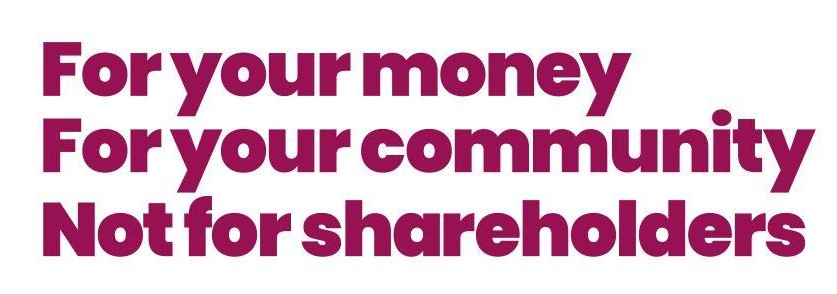The original money movement still doing business differently
Customer-owned building societies and credit unions prioritise customers over profit, meaning their culture, behaviour and decisions are different to banks, and their customers get better products, fairer rates and better services.
 Building societies have been part of our communities for 250 years. Set up to help ordinary working people to help themselves to build their financial resilience and have a home of their own, they are the original money movement. And today all 42 building societies, along with credit unions, continue to keep these basic principles at the core of their business.
Building societies have been part of our communities for 250 years. Set up to help ordinary working people to help themselves to build their financial resilience and have a home of their own, they are the original money movement. And today all 42 building societies, along with credit unions, continue to keep these basic principles at the core of their business.
In the last five years building societies have punched well above their weight. They have:
- Helped almost half a million first-time buyers get on the property ladder
- Paid savers £5.4 billion more interest than they would have got from the big banks
- Increased their share of high street branches to 30 per cent (from 20 per cent)
They have been able to deliver this extra value to their customers because as mutual businesses they have a different way of working.
The main difference when compared to banks is that building societies do not have any external shareholders. They are owned by their 25 million customers, who automatically become a member when they take out a mortgage or open a savings account. So whilst banks’ primary focus must be on maximising profits to pay out to external shareholders, building societies make enough profit to ensure they remain safe and sustainable, with any further profit reinvested back in the business and local communities. This gives their customers overall better value and service.
Supporting homeownership
Building societies have a strong history of offering innovative mortgage products to overcome the barriers faced by people trying to buy their own home, particularly first-time buyers. In the last five years they have helped almost half a million (496,760) aspiring homeowners by providing them with a mortgage to buy their first home.
Many do this by taking an individual approach to reviewing mortgage applications, rejecting the ‘computer says no’ approach often adopted by banks. Others have innovative products and policies such as no-deposit or very low-deposit mortgages, six-times income mortgages and schemes such as rent to home, all aimed at helping more first-time buyers onto the property ladder.
Indeed, it is building societies which have provided almost all of the recent growth in the UK mortgage market. Building societies provided 89 per cent of the mortgage growth in the nine months to Sept 2024. Strong evidence that they continue to find solutions to the challenges facing today’s homeowners and aspiring homeowners.
Supporting savings aspirations
Helping people to build financial resilience and make the most of their savings is a priority for building societies and credit unions.
In the last five years, building society savers received an extra £5.4 billion more in interest than if they had been paid the average rates offered by large banks.
It’s not surprising that with better overall value provided by building societies, in the nine months to September 2024 they attracted £20.7bn in cash savings, accounting for more than a third (34 per cent) of all the growth in UK savings balances.
There are sadly many people in the UK with little or no savings to fall back on, and with more than £250bn in current accounts earning no interest at all, many others who have managed to build a savings pot but could make much more of it. The Building Societies Association (BSA) therefore created UK Savings Week, an annual campaign to help encourage better savings habits, leading to improved financial resilience and mental wellbeing.
Following the 2024 UK Savings Week, 70 per cent of people who had heard of the campaign had taken, or planned to take, positive action, such as increasing their savings or moving their savings to better paying accounts. Of those who engaged in the week, 26 per cent started saving for the first time.
Supporting communities
In prioritising their customers, building societies and credit unions support and invest in their local communities, through charitable partnerships, community projects and employee volunteering.
Building societies are more likely than banks to retain their branches, providing 30 per cent* of current high street branches, 50 per cent more than their share (20 per cent) five years ago. Some have committed to retain high street branches and others are innovating to develop the branch of the future.
No wonder 72 per cent of building society customers said they are an important part of their community, compared to just 54 per cent of bank customers.
The original money movement
Building societies and credit unions have never lost sight of their purpose, they remain the original money movement, set up by ordinary working people, for ordinary working people, and to help their local communities to thrive.
As customer-owned financial institutions they proudly do business differently, and there is tangible evidence of the extra value they deliver for their members.
As we look to the future, we hope that consumers consciously thinking about who they do their financial business with, and choose an organisation that genuinely cares about its customers, who treats them as an individual, and keeps them at the heart of every decision they make.
The Original Money Movement: For your money, for your community, not for shareholders.
* Doesn’t include the branches of Virgin Money or Co-operative Bank which are now owned by building societies.
